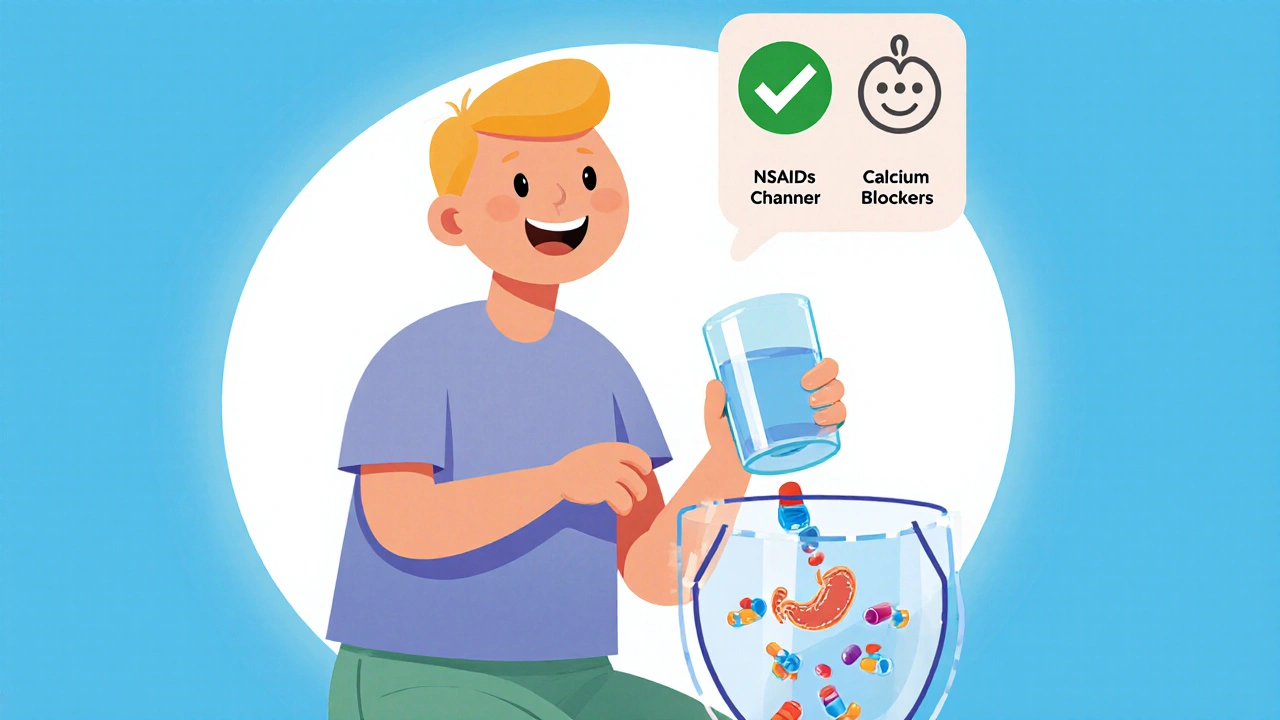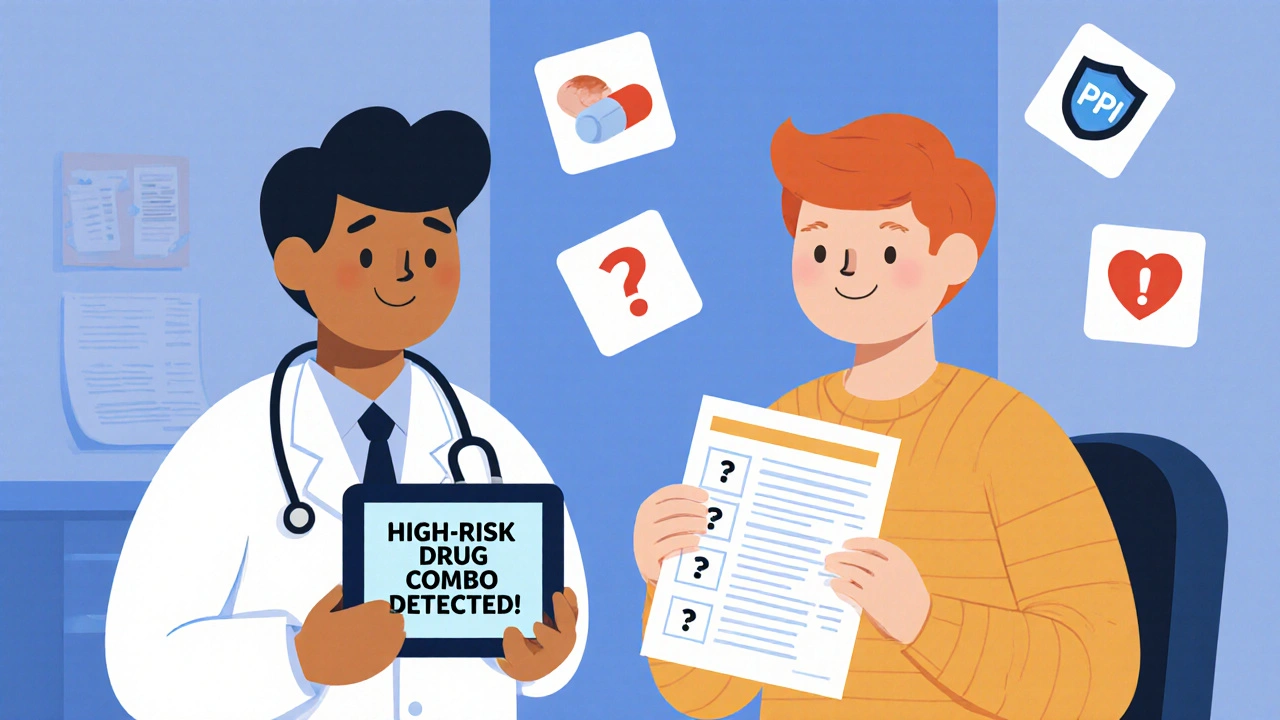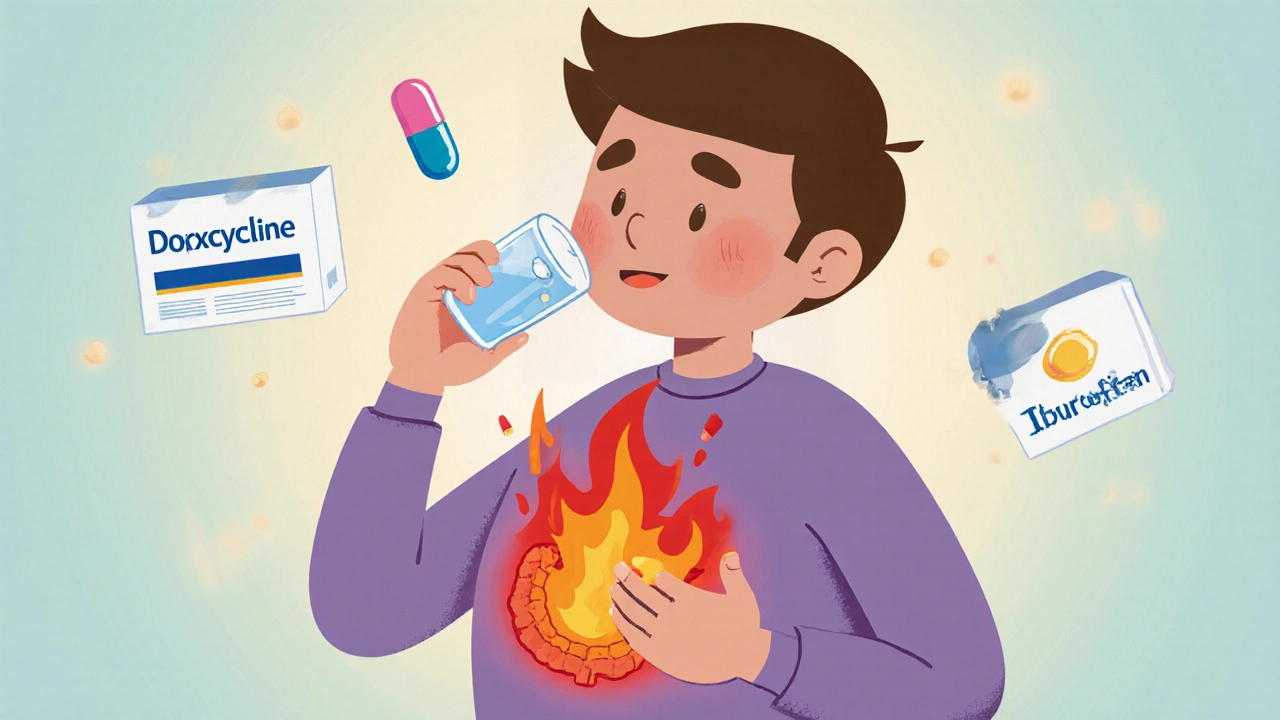Medication Heartburn Risk Checker
Enter medications you're taking to check risk of heartburn and receive tailored prevention tips.
Why Your Medication Is Causing Heartburn and Upset Stomach
It’s not just spicy food or stress causing your heartburn. If you’re on regular medication, the culprit might be right in your pill bottle. Many common drugs - from pain relievers to antibiotics - directly irritate your stomach lining or weaken the muscle that keeps acid from rising into your esophagus. This isn’t rare. About 1 in 5 people taking NSAIDs like ibuprofen or aspirin get heartburn or an upset stomach. For antibiotics like doxycycline, improper swallowing can lead to painful esophageal burns in up to 12% of users. These aren’t side effects you should just tolerate. They’re warning signs that your body is reacting to the drug - and there are proven ways to stop them without quitting your treatment.
Medications That Commonly Trigger Heartburn
Not all drugs affect your gut the same way. Some damage the lining. Others relax the valve between your stomach and esophagus. Here are the top offenders and how they work:
- NSAIDs (ibuprofen, naproxen, aspirin): These block protective chemicals in your stomach lining. Without them, acid eats away at your tissue. About 20-30% of people taking ibuprofen regularly get heartburn. Long-term use raises ulcer risk from 1-2% to over 25%.
- Tetracycline antibiotics (doxycycline): If you swallow these pills with little water or lie down right after, they can stick to your esophagus and burn it. About 12% of people who don’t follow proper dosing get pill-induced esophagitis - sometimes with ulcers.
- Calcium channel blockers (amlodipine, nifedipine): Used for high blood pressure, these relax smooth muscles, including the lower esophageal sphincter. That lets acid creep up. Around 10-20% of users report worsening heartburn.
- Theophylline (asthma medication): This drug weakens the esophageal sphincter by 30-50%, making reflux almost inevitable for some. Up to 30% of users have symptoms.
- Metformin (diabetes drug): Almost 1 in 3 new users get nausea, bloating, or heartburn. But here’s the good news: for 60-70% of people, these symptoms fade within 2-4 weeks as the body adjusts.
- Bisphosphonates (alendronate for osteoporosis): These are the most dangerous if misused. Taking them lying down or without enough water can cause severe esophageal injury - even hospitalization in rare cases.
What You Can Do Right Now to Reduce Symptoms
You don’t have to suffer. Simple, evidence-based habits can cut your symptoms in half - or more.
- Take pills with a full glass of water (8 oz): This isn’t just advice - it’s a medical rule. For doxycycline and bisphosphonates, drinking a full glass reduces esophagitis risk by 60-70%. Don’t gulp it down quickly. Sip slowly as you swallow.
- Stay upright for at least 30-60 minutes after taking meds: Gravity keeps pills moving down. Lying down lets them linger. If you take doxycycline or alendronate, sit or stand for an hour. No napping. No lounging on the couch.
- Take NSAIDs with food: Eating before or with ibuprofen or aspirin reduces heartburn by 40-50%. A small snack like toast or yogurt is enough. Don’t wait until you feel pain - do it before you take the pill.
- Use OTC antacids before your dose: If you take NSAIDs daily, try an antacid like Tums or Rolaids 30 minutes before. This neutralizes acid before it can irritate your lining. It cuts heartburn by 30-40%.
- Ask your doctor about PPIs if you’re on long-term NSAIDs: Proton pump inhibitors like omeprazole reduce stomach acid by up to 90%. For people at high risk of ulcers, adding a PPI cuts NSAID-related ulcers by 70-80%.

When to Worry - Red Flags You Can’t Ignore
Most medication-induced heartburn is annoying, not dangerous. But some signs mean you need help fast.
- Chest pain that feels like pressure or tightness: This could be heartburn - or it could be your heart. If you’re over 50 or have risk factors like high blood pressure, get it checked.
- Difficulty swallowing or pain when swallowing: If food feels stuck or hurts going down, you might have an esophageal ulcer or narrowing.
- Blood in vomit or black, tarry stools: This means bleeding in your stomach or intestines. NSAIDs can cause this. Don’t wait. Call your doctor today.
- Symptoms lasting more than 2 weeks despite changes: If you’ve followed all the steps and still feel burning, your stomach lining may be damaged. You need a proper evaluation.
Never stop a prescribed medication just because it gives you heartburn. Stopping blood pressure meds suddenly can cause a spike in blood pressure. Stopping metformin can make your diabetes worse. Talk to your doctor - don’t quit on your own.
New Options and Advances in 2025
The field is changing. Doctors now have better tools to protect your stomach while keeping your treatment effective.
- Delayed-release doxycycline: Approved in 2022, this version dissolves in your intestines instead of your esophagus. It cuts esophagitis risk by 40-50%.
- Coated NSAIDs: New formulations with protective shells reduce stomach irritation by 30-35%. Ask your pharmacist if these are available for your prescription.
- Electronic alerts in EHR systems: Many clinics now use software that flags when a patient is on multiple high-risk drugs - like an NSAID plus a calcium channel blocker. Your doctor might get a warning before you even feel symptoms.
- Future options: Researchers are testing skin patches and under-the-tongue versions of drugs like NSAIDs and metformin. These bypass the stomach entirely. Phase 2 trials are promising, with results expected by 2026.

What Your Doctor Should Be Asking You
Many doctors don’t connect your heartburn to your meds. You have to speak up. Here’s what to say:
- “I started taking [medication name] and now I get heartburn every time.”
- “I’m taking it with food and water, but it’s still bothering me.”
- “Is there a safer alternative? Or can we add a protective medication?”
Doctors know about these side effects. But they assume you’ll mention them. Don’t wait for them to ask. Bring it up at your next visit. You’re not being difficult - you’re being smart.
Final Advice: Don’t Choose Between Health and Comfort
You don’t have to pick between taking your medicine and feeling okay. Most medication-induced heartburn is preventable. With the right habits - water, upright posture, food, and sometimes a PPI - you can keep your treatment and ditch the burning. The goal isn’t to avoid all discomfort. It’s to avoid avoidable damage. Millions of people manage this every day. You can too.
Can I take antacids with my medication?
Yes - but timing matters. Antacids like Tums or Rolaids can help reduce heartburn from NSAIDs if taken 30 minutes before your dose. But don’t take them with antibiotics like doxycycline or thyroid meds - they can block absorption. Always check with your pharmacist or doctor about interactions.
Will my stomach get used to metformin?
Yes, for most people. About 60-70% of users find their nausea, bloating, and heartburn fade within 2-4 weeks of continuing the medication. Try taking it with meals and start with a low dose. If symptoms last longer than a month, talk to your doctor about switching to extended-release metformin, which is gentler on the stomach.
Is heartburn from ibuprofen dangerous?
Occasional heartburn isn’t dangerous, but regular use without protection can lead to ulcers or bleeding. Chronic NSAID users have a 15-30% risk of developing stomach ulcers. If you take ibuprofen daily for more than a few weeks, ask your doctor about adding a proton pump inhibitor (PPI) to protect your stomach lining.
Why does doxycycline cause esophagitis?
Doxycycline pills can stick to the esophagus if swallowed with too little water or if you lie down right after. The drug is acidic and can burn the lining, causing ulcers. Taking it with a full glass of water and staying upright for an hour prevents this in 95% of cases.
Should I switch to a different blood pressure pill if I get heartburn?
It depends. Calcium channel blockers like amlodipine are common causes of heartburn. Beta blockers, on the other hand, cause heartburn in only 5-10% of users. If your heartburn is severe and you’re on a calcium channel blocker, ask your doctor if a beta blocker or ACE inhibitor might be a better fit - especially if you have other GERD risk factors.
Can I use natural remedies like ginger or aloe vera?
Ginger tea or aloe vera juice may soothe mild irritation, but they don’t fix the root cause: the drug itself. If your heartburn is from NSAIDs or antibiotics, natural remedies won’t prevent damage. They can be used as extra support, but never as a replacement for proven strategies like water, upright posture, or PPIs.
How long does it take for symptoms to go away after stopping the drug?
It varies. For NSAIDs, symptoms often improve within a few days after stopping. For antibiotics like doxycycline, esophagitis may take 1-2 weeks to heal. If you’ve had chronic exposure - especially with NSAIDs or bisphosphonates - healing can take weeks to months. Always follow up with your doctor to ensure no lasting damage.
Is it safe to take PPIs long-term to protect my stomach?
For people on long-term NSAIDs or with a history of ulcers, yes. Studies show PPIs are safe for years when medically necessary. However, they’re not meant for everyone. Long-term use can affect nutrient absorption and increase infection risk. Always use the lowest effective dose and re-evaluate with your doctor every 6-12 months.


Angie Creed
So let me get this straight: we’re told to swallow pills like they’re holy water, but the pharmaceutical industry designed them to burn us alive? And now we’re supposed to be grateful for a 'delayed-release' version that just makes the pill more expensive? This isn’t medicine-it’s a corporate loophole dressed in lab coats. The real solution? Stop taking all of it. Your body doesn’t need ibuprofen. It needs silence. And water. And maybe a therapist.
October 30, 2025 AT 23:26
Michael Ferguson
Look, I’ve been on metformin for six years, and I’ve read every peer-reviewed study on GI distress from pharmaceuticals, and I’ve personally tested every single one of these ‘evidence-based habits’ you listed-except the one about staying upright for an hour, because I’m not a monk, and I’ve got a toddler who screams if I don’t pick her up immediately after I take my meds. But here’s what nobody tells you: the real problem is that doctors are trained to treat symptoms, not to question the entire pharmacological paradigm. You want to reduce heartburn? Stop trusting Big Pharma. Start fasting. Start drinking apple cider vinegar. Start listening to your gut-literally. Your body is trying to tell you something. And no, antacids aren’t the answer-they’re just chemical bandages on a bullet wound.
October 31, 2025 AT 08:48
Caden Little
Hey everyone, just wanted to say this post is super helpful 😊 I’ve been on doxycycline for acne and was terrified I’d get esophagitis-then I started drinking a full glass of water and sitting up for 45 minutes after. No issues since! Also, taking Tums 30 mins before NSAIDs? Game changer. My stomach stopped screaming. Just a little tip: if you’re on metformin, start with half a pill and slowly increase. It’s a pain at first, but your gut *does* adjust. You got this! 💪
November 2, 2025 AT 02:59
Sebastian Brice
I appreciate how detailed this is. Honestly, most people just power through the burn and assume it’s ‘normal.’ But you’re right-it’s not. I had a friend who took alendronate lying down after a late-night snack and ended up in the ER. She didn’t even know it was a thing. So thank you for writing this. I’m going to print it out and give it to my mom. She’s on three of these meds. She deserves to not feel like her throat is on fire every morning.
November 2, 2025 AT 10:11
Jim Aondongu
This is all nonsense the government wants you to believe. Water? Upright? Antacids? Please. The real cause is glyphosate in your food and fluoride in the water. These pills are fine. Its your body that is poisoned. Stop blaming medicine. Start blaming the system. And if you take a pill with water then why not just inject it? Why not just swallow it dry? Why not just accept pain as part of life? You are weak if you need all these rules. Just take the pill and shut up
November 3, 2025 AT 03:14
Michael Schaller
I’ve been on amlodipine for five years and never realized it was causing my heartburn until I read this. I thought it was just aging. I started taking it with a big meal and standing up for 20 minutes after. It’s been a month-zero burning. I didn’t even know it was an option. Thanks for the clarity.
November 3, 2025 AT 05:32
Kyle Tampier
This is all a lie. The FDA is in bed with Big Pharma. The ‘delayed-release’ doxycycline? It’s a trap. They’re slowly replacing all meds with ‘safe’ versions so they can track you via your stomach acid. The water? It’s laced with microchips. The upright posture? It’s so your body aligns with the satellite network. Don’t take anything. Don’t drink water. Don’t trust anyone. Especially not doctors. They’re paid by the pill companies. I’ve seen the documents. I’ve seen the emails. I’ve seen the redacted pages. You’re being lied to. Always.
November 4, 2025 AT 04:57
Tom Caruana
OMG I’ve been taking ibuprofen for my back and I thought it was just stress 😭 I started taking it with a banana and standing up and it’s like a miracle!!! My stomach stopped crying!! I’m so happy I cried for like 20 minutes!! 😭❤️🙏 Can we all hug now? I feel seen. I feel heard. I feel… not poisoned.
November 5, 2025 AT 21:38
Muzzafar Magray
You people are ridiculous. This is not medicine. This is fear-mongering dressed as advice. In India, we take pills with a sip of tea and go right back to work. No water. No standing. No antacids. We don’t have time for your Western neurosis. Your stomach is weak because you eat too much sugar and sit too much. Take the pill. Move your body. Stop complaining. Your ancestors survived without PPIs and your body can too.
November 7, 2025 AT 04:09